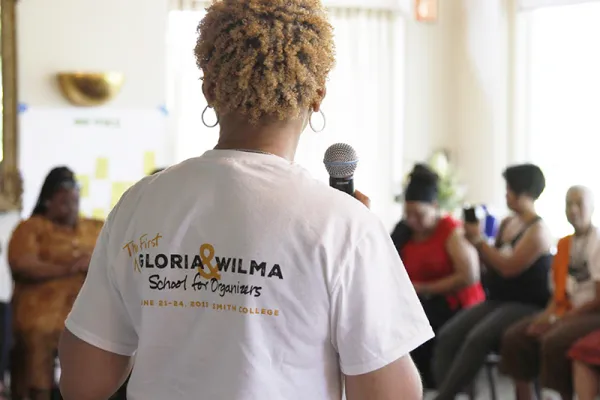Sharing Insights: Smith’s Steinem Initiative Hosts Conversation for Women Organizers
Campus Life

Published June 17, 2016
In her daily life as a labor organizer, Caitlin DuBois ’13 says she is “constantly in motion.”
There is little time to pause and reflect on the work she is doing for the New England chapter of UNITEHere!, a union representing thousands of mostly female workers in industries ranging from food services to textiles.
That’s why DuBois is looking forward to attending the second annual Gloria & Wilma School for Organizers June 20–23 at Smith.
“It’s a chance to explore how we build our skills and talk about what it really means to be organizers,” says DuBois, who lives in Northampton. “That’s something we rarely get to do.”
This year’s gathering—hosted by the college’s Steinem Initiative—aims to tackle two key questions: What is life like for women organizers? And how do their experiences help shape larger movements for social justice?
It’s a way to deepen our knowledge of the place that gender justice has inside those broader movements.
Founding the Gloria & Wilma School was a longtime dream of feminist leader Gloria Steinem ’56, and the late Wilma Mankiller, the first woman elected chief of the Cherokee Nation. The 2015 inaugural school at Smith focused on how activists can “put history into action” by using the college’s extensive women’s history archives at the Sophia Smith Collection as a tool to strengthen organizing.
This year’s school is designed as a three-day conversation about how the experiences of women organizers influence larger efforts for social change.
“It’s a way to deepen our knowledge of the place that gender justice has inside those broader movements,” says Joyce Follet, co-director of the Steinem Initiative.
Nearly two dozen participants, drawn from labor, reproductive rights, indigenous and LGBTQ groups around the country, will be sharing their stories and reflecting on what is unique—and uniquely powerful—about the work of women organizers.
DuBois attended last summer’s school for organizers and says the lessons learned inspired her to come back for this year’s conversation.
“The experience really strengthened the work I do,” she says. “It made me think about how talking about women workers changes the organizing we’re doing.”
Helena Wong—a national organizer with the Grassroots Global Justice Alliance and a first-time participant in the Gloria & Wilma School—says she looks forward to exploring how women, in particular, are affected by housing, policing, healthcare and other social justice issues.
“What this conversation lets us do is say ‘All of the issues we are working on are women’s issues,’” says Wong, who is based in New York. “How do we ground ourselves in a race, class and gender analysis so that our organizing is that much stronger? How do we lift up the stories of women in our organizing?”
Elevating women’s stories is the underlying mission of the Steinem Initiative, a two-year pilot program that aims to increase access by activists to Smith’s extraordinary women’s history archives.
The summer school for organizers is one of three main components of the Initiative, which runs through 2017. The others are a public history program and curricular activities involving Smith students and faculty.
The Steinem Initiative also coordinates an activist-in-residence program that brings social justice organizers to campus to share their expertise with the college community.
This past spring, activist Bekezela Mguni of Pittsburgh collaborated with student groups on “The Black Unicorn Reading Room,” a pop-up library of works by queer and trans people of color. This fall, the Steinem Initiative will choose a new activist-in-residence for spring semester 2017.
In October, the program will convene a group of reproductive justice activists who will use design thinking to explore new ways to bridge academia and activism, says Sara Gould, the initiative’s other co-director.
“The Initiative’s primary goal is to gather evidence that using history as a tool for activism has an impact,” Gould says. “As we enter the final year of the pilot project at Smith, we will be producing new knowledge about women organizers and gender justice.”
Photo from 2015 Gloria & Wilma School by Jenny Warburg